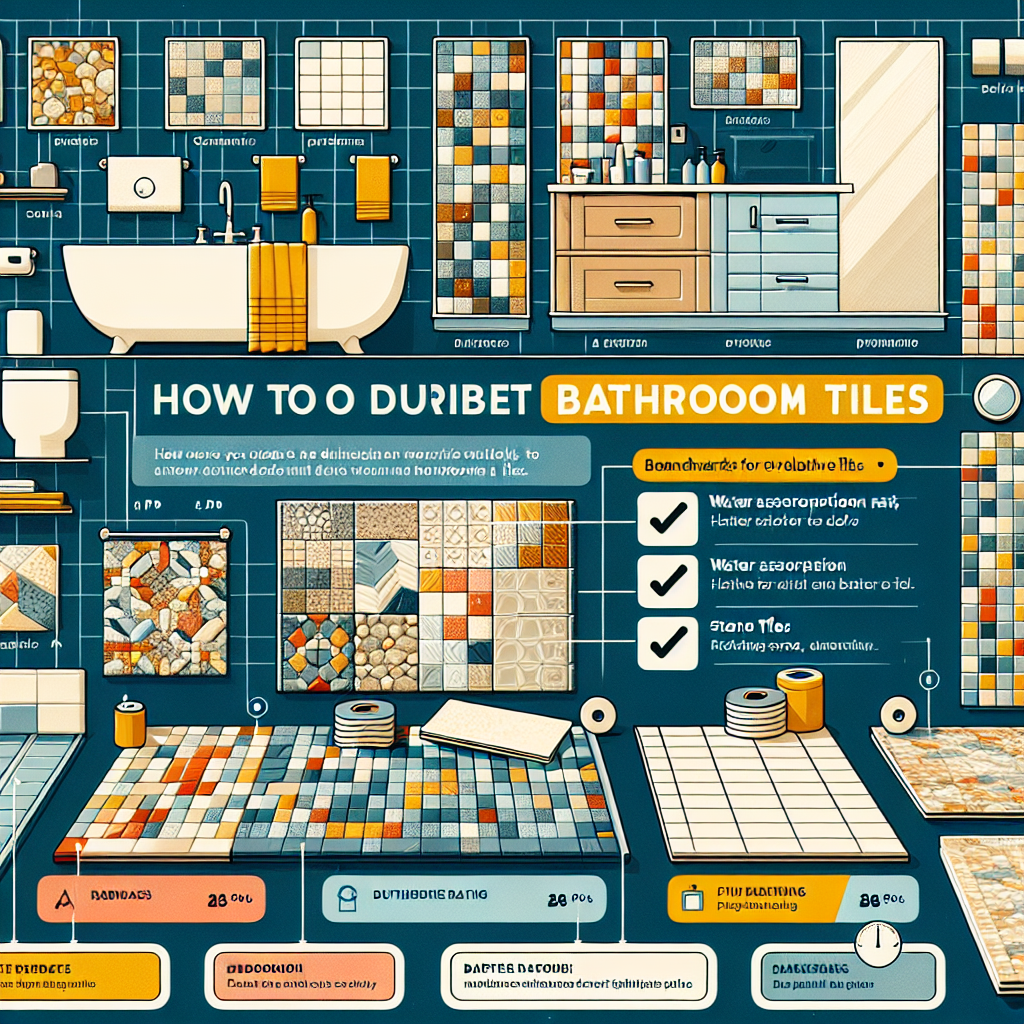Guidelines for Selecting Durable Bathroom Tiles

When it comes to designing or renovating a bathroom, one of the most important decisions you’ll make is selecting the right tiles. Bathroom tiles not only enhance the aesthetic appeal of the space but also play a crucial role in ensuring durability and functionality. With a wide range of options available in the market, it can be overwhelming to choose the right tiles for your bathroom. In this article, we will provide you with comprehensive guidelines to help you select durable bathroom tiles that meet your needs and preferences.
1. Consider the Material
The material of the tiles is a crucial factor to consider when selecting bathroom tiles. Different materials offer varying levels of durability, maintenance requirements, and resistance to moisture. Here are some popular tile materials to consider:
- Ceramic Tiles: Ceramic tiles are a popular choice for bathrooms due to their affordability, versatility, and water resistance. They are available in various colors, patterns, and textures, making them suitable for different design styles.
- Porcelain Tiles: Porcelain tiles are known for their exceptional durability and water resistance. They are harder and denser than ceramic tiles, making them suitable for high-traffic areas. Porcelain tiles are available in a wide range of designs, including ones that mimic natural stone.
- Natural Stone Tiles: Natural stone tiles, such as marble, granite, and travertine, add a luxurious and timeless appeal to bathrooms. However, they require regular sealing and maintenance to prevent staining and water damage.
- Glass Tiles: Glass tiles are a popular choice for creating a modern and sleek look in bathrooms. They are resistant to stains and moisture, making them easy to clean. However, they can be more prone to scratching and cracking compared to other materials.
2. Assess Slip Resistance
Slip resistance is a crucial factor to consider, especially in bathroom areas where water and soap can make the floor slippery. Look for tiles with a slip-resistant rating to ensure safety. The coefficient of friction (COF) is used to measure slip resistance, with higher values indicating better slip resistance. Tiles with a COF of 0.5 or higher are considered slip-resistant.
3. Evaluate Water Resistance
Bathrooms are exposed to high levels of moisture, so it’s essential to choose tiles that are water-resistant. Porcelain and ceramic tiles are naturally water-resistant, but it’s important to ensure proper installation to prevent water seepage. Additionally, consider using grout sealers to enhance water resistance and prevent mold and mildew growth.
4. Consider Maintenance Requirements
Consider the maintenance requirements of different tile materials before making a decision. Some tiles, such as natural stone, require regular sealing and special cleaning products to maintain their appearance and durability. On the other hand, ceramic and porcelain tiles are relatively low-maintenance and easy to clean.
5. Think about Longevity
Investing in durable bathroom tiles is essential to ensure longevity and avoid frequent replacements. Consider the expected lifespan of different tile materials and their ability to withstand wear and tear. Porcelain tiles are known for their exceptional durability and can last for decades with proper care.
Frequently Asked Questions about “Guidelines for Selecting Durable Bathroom Tiles”
1. What are the most durable bathroom tile materials?
Porcelain tiles are considered the most durable bathroom tile material due to their hardness and density. They are resistant to scratches, stains, and moisture, making them suitable for high-traffic areas.
2. Are natural stone tiles a good choice for bathrooms?
Natural stone tiles, such as marble and granite, can add a luxurious and timeless appeal to bathrooms. However, they require regular sealing and maintenance to prevent staining and water damage. It’s important to consider the maintenance requirements before choosing natural stone tiles.
3. How can I ensure slip resistance in bathroom tiles?
To ensure slip resistance, look for tiles with a slip-resistant rating and a coefficient of friction (COF) of 0.5 or higher. Additionally, choose tiles with textured surfaces or opt for smaller tile sizes to increase traction.
4. Do I need to seal ceramic or porcelain tiles?
Ceramic and porcelain tiles are naturally water-resistant and do not require sealing. However, it’s important to ensure proper installation and use grout sealers to enhance water resistance and prevent mold and mildew growth.
5. How long do bathroom tiles typically last?
The lifespan of bathroom tiles depends on various factors, including the material, quality, and maintenance. Porcelain tiles, known for their durability, can last for several decades with proper care. On the other hand, natural stone tiles may require more frequent maintenance and replacement.
Summary
Selecting durable bathroom tiles is crucial for creating a functional and long-lasting bathroom. Consider the material, slip resistance, water resistance, maintenance requirements, and longevity of the tiles before making a decision. Porcelain tiles are often the top choice for their exceptional durability and water resistance. Natural stone tiles can add a luxurious appeal but require regular maintenance. Ensure proper installation and consider using grout sealers to enhance water resistance. By following these guidelines, you can choose bathroom tiles that not only enhance the aesthetic appeal but also withstand the test of time.
For professional assistance with your bathroom renovation, contact North Bay Contractors.

